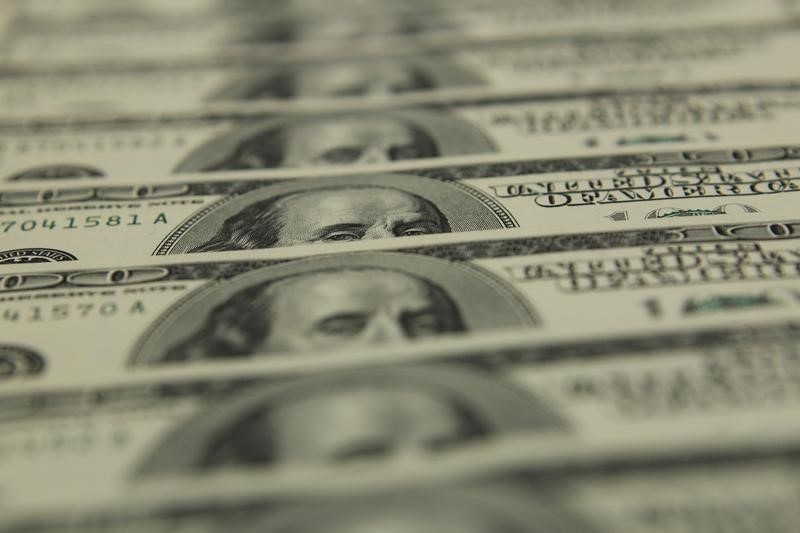 © Reuters.
© Reuters.
Investing.com - The U.S. dollar edged lower in early European trade Thursday, but remained near its recent two-month high with traders anticipating next week’s U.S. Federal Reserve’s policy-setting meeting.
At 03:15 ET (07:15 GMT), the Dollar Index, which tracks the greenback against a basket of six other currencies, traded 0.1% lower at 104.002, just below the 2-month peak of 104.70 seen last week.
One more hike by the Fed?
The U.S. central bank is widely expected to pause its year-long interest rate hiking cycle next week, and expectations are growing that this could be a temporary position and another rate increase is still a distinct possibility this year, possibly in July.
These increased expectations that U.S. interest rates may have further to rise have come on the back of surprise rate increases by the Bank of Canada and the Reserve Bank of Australia this week, with both central banks bemoaning the sticky nature of their inflation.
The Fed will see the latest consumer prices before they make their decision on interest rates, and any upwards move from May’s 4.9% annual figure would likely cement another hike.
"The U.S. economy continues to surprise to the upside, while Europe and China have been weaker than expected...this pattern will have to abate before medium-term shallow dollar depreciation can come back into view," said Goldman Sachs, in a note.
ECB officials still hawkish
EUR/USD rose 0.1% to 1.0711, with officials at the European Central Bank continuing to paint a hawkish picture over future interest rates as they attempt to tame inflation still at elevated levels.
Dutch central bank chief Klaas Knot was the latest to point to more tightening, saying on Wednesday that he’s “not yet convinced that the current tightening is sufficient,” adding “inflation could well remain too high for a long time and further rate hikes will then be necessary.”
However, economic data of late has pointed to a region still struggling to recover from the difficulties caused by last year’s soaring energy prices.
The latest iteration of eurozone GDP is expected to show that the region stagnated in the first three months of this year, growing just 1.2% on an annual basis.
Unemployment data could weigh on sterling
GBP/USD rose 0.1% to 1.2452, trading in a tight range with traders awaiting next week’s release of jobs and wages data.
“We see that as a negative event risk for sterling, where wage growth could continue to slow and take some of the steam out of the 100bp+ Bank of England tightening expectations still priced in by money markets,” said ING, in a note.
AUD/USD rose 0.3% to 0.6667, with the Aussie dollar still benefiting from this week’s surprise RBA hike and USD/JPY fell 0.2% to 139.88, taking some support from an upward revision to the country’s first quarter gross domestic product reading.
USD/CNY rose 0.1% to 7.1333, with the yuan hitting a fresh six-month low against the dollar on growing expectations of an interest rate cut by the People’s Bank of China this month.

